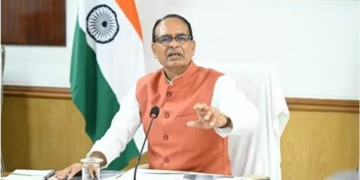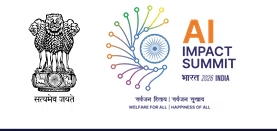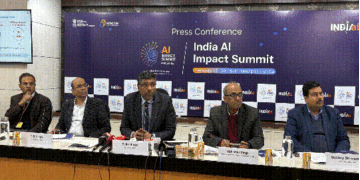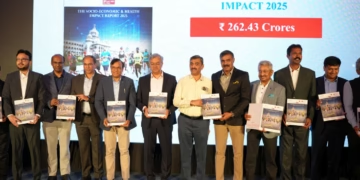Bengaluru, September 19, 2024:
“The space era, which began with the launch of Sputnik in the 50s, has been undergoing a major transformation in recent years with the intense participation of private companies and mushrooming innovations spanning the entire spectrum of space technology, especially following the launch of SpaceX’s spacecraft in 2008. India is all set to seize the momentum with the government accelerating ambitious space programs and proactively engaging the private players,” Dr S. Unnikrishnan Nair, Director, Vikram Sarabhai Space Centre.
Providing the Opening Remarks at the session on ‘Futuristic Emerging Technologies in Space: Commercial Prospects’ at the day 2 of Bengaluru Space Expo, being organised by the Confederation of Indian Industry in association with Indian Space Research Organisation, he pointed out sky is truly the limit for India’s space sector, as the cabinet has just approved major space missions, including Chandrayaan-4 for lunar sample return, Bharatiya Antariksh Station by 2035, and a Venus Orbiter Mission. There are nearly 300 space startups in the country, and the private players are rapidly churning out space technology innovations based on AI, quantum computing, reusable technologies, among others, making this sectoral ecosystem in the country more accessible, sustainable, and profitable. “The observable universe spans an astonishing 93 billion light years in diameter. Yet, the farthest a spacecraft has travelled is a mere 24 billion kilometres, and the farthest a human crew has journeyed in space is just 400,000 kilometres. Considering the vastness of space, there is unimaginable room for exploration and growth,” he exclaimed.
Addressing the panel, Ms Nigar Shaji, Associate Director, U R Rao Satellite Centre, said that the space sector has migrated from the realm of luxury to the paradigm of necessity. There is a flurry of activities both in space for earth, and space for space – two broad segments of the industry. “The former comprises satellites and space-based services is well established. With the thrust of making humans a multiplanetary species, and understanding the physical and biological nature of the universe, the latter is witnessing a new wave of dynamism,” she said.
In his address, Mr Sumitesh Sarkar, Associate Director, Space Application Centre, ISRO, said that autonomous systems, in situ resource utilisation, robust propulsion systems, and microbiology based space materials have become the hotbed of research and innovations. He emphasised that the need of the hour is regulations for long term sustainability, and the need for creating an ubiquitous, secured connectivity based on universal communications and navigations network.
Commenting on the challenges in the space sector, Mr Rahul Rawat, COO, Digantara, said, “Initially, the idea was to send satellites to space just for the sake of it. However, as we involve humans and as we realise the potential of space technology in solving human problems, a new set of challenges have emerged. The first is to make launching vehicles safe for humans onboard, and then protecting them from radiation while they are operating in space, and bringing them back. All these need not only technology, but also standard operating procedures and guidelines,” he pointed out.
Mr Karthik Govindhasamy, Co-Founder & CTO, Antaris Space, said that the scope for advancements in the domains such as quantum computing, high speed data, RF, laser and high precision control systems is huge. “However, we need to evolve use cases to leverage advances in these areas and come up with practical innovations. Digital transformation in the space sector is critical. For instance, stimulation alone can help us cut down cost and improve efficiency,” he said and added that the ultimate goal would be to create cognitive spacecraft that are capable of diagnosing and solving problems on their own.
Mr Rohan Ganapathy, CEO & CTO, Bellatrix Aerospace Private Limited, cited, as the chemical propellants are not efficient, and electric propulsion does not work well beyond the mars orbit, it is important for the industry to focus on building modular nuclear reactors. Mr Vishesh Vatsal, CTO, Sky Serve, said that the applications of edge computing in the space sector is vital for a wide range of areas from disaster management to wild file and flood monitoring. Mr N. Balaji, AGM, Aerospace, HAL, cited introducing smart and intelligent manufacturing in making the launching vehicles and spacecraft will reduce cost, shorten the production time, and thus help in scaling up.














































